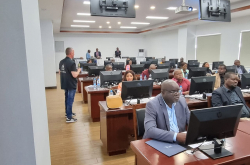Timeframe: 2022 - 2024
Budget: EUR 5 million
Donor: European Union
The situation
As new technologies become available for legitimate use, there is an increased risk that terrorist groups will exploit them for their own aims.
There is a real danger that foreign terrorist fighters will use their tactical experience from battlefields and conflict zones to exploit vulnerabilities in emerging technologies to plot and/or carry out terrorist attacks in the future.
Extremist groups rely on the Internet and social media platforms to communicate and coordinate their activities. They use them to recruit new members, promote their presence via photos and video, and raise funds.
Social media platforms are also widely used to identify targets and plan and conduct attacks, as well as to circulate manuals on bomb making and how to distribute chemical and biological weapons.
Law enforcement agencies in INTERPOL member countries need to consider new technologies in two ways:
- Understand and address the ways in which terrorists use new technologies.
- Adopt new technologies themselves in order to anticipate and react to terrorist-related challenges and activities.
About the Project
Working jointly with the UN Counter-Terrorism Centre (UNCCT), INTERPOL will assist member countries to implement counter-terrorism strategies aimed at combating terrorists’ exploitation of new and emerging technologies. Activities will enhance operational, investigative and analytical capabilities.
In June 2023, during the 3rd United Nations Counter-Terrorism Week, seven new knowledge products were launched under the CT TECH initiative. The knowledge products are accessible here: https://www.un.org/counterterrorism/ct-tech-initiative
Project activities
Activities under Project CT-Tech include:
- Conducting a needs assessment on current threats and their connection to new and emerging technologies;
- Increasing international cooperation for counter-terrorism investigations in relevant fields;
- Producing manuals to highlight good practices for seizures and cooperation with ICTs.
- Developing webinars, e-learning modules and applied learning sessions on facial recognition, open source intelligence (OSINT) and Dark net/virtual assets;
- Running training courses and regional working group meetings on the use of INTERPOL’s biometrics capabilities;
- Delivering training on collection, preservation and use of digital evidence in prosecutions.
Training events held
INTERPOL's Facial Recognition System & Effective Training Skills (EU/MENA)
Sarajevo, Bosnia and Herzegovina
5-7 March 2024
https://twitter.com/INTERPOL_HQ/status/1770455443229310998?s=20
Open Source Intelligence Analysis (Egypt)
Cairo, Egypt
20-22 February 2024
Darknet and Virtual Assets Training (Africa)
Abuja, Nigeria
13-15 February 2024
https://twitter.com/interpol_hq/status/1758510848325156902?s=46&t=jLE1kmBBVPfPJtiI0-nBTQ
Open Source Intelligence (OSINT), Darknet and Virtual Assets Training ( Americas)
Lyon, France
29 January to 1 February 2024
https://twitter.com/INTERPOL_HQ/status/1752798925558313121
Open Source Intelligence (OSINT), Darknet and Virtual Assets Training ( Europe/MENA)
Tirana, Albania
4-7 December 2023
INTERPOL's Facial Recognition System & Effective Training Skills (Asia)
Manila, Philippines
14-16 November 2023
https://twitter.com/interpol_hq/status/1734161946750951933
Open Source Intelligence (OSINT) Training (Africa)
Nairobi, Kenya
16-19 October 2023
https://twitter.com/INTERPOL_HQ/status/1714545549364404303
Open Source Intelligence (OSINT) Training (Asia)
IGCI, Singapore
4-8 September 2023
https://twitter.com/INTERPOL_HQ/status/1700151101570314475
INTERPOL's Facial Recognition System & Effective Training Skills (Africa)
Zanzibar, Tanzania
25-27 July 2023
https://twitter.com/INTERPOL_HQ/status/1684189870841909249
INTERPOL's Facial Recognition System & Effective Training Skills (Americas)
Port of Spain, Trinidad and Tobago
28-30 March 2023
https://twitter.com/INTERPOL_HQ/status/1641092364868395009
Applied Learning Session (Biometrics)
Islamabad, Pakistan
31 Jan - 2 Feb 2023
See also
Related news

260 suspected scammers arrested in pan-African cybercrime operation
26 September 2025
Disrupting a Grandoreiro malware operation
18 March 2024
INTERPOL-led operation targets growing cyber threats
1 February 2024




